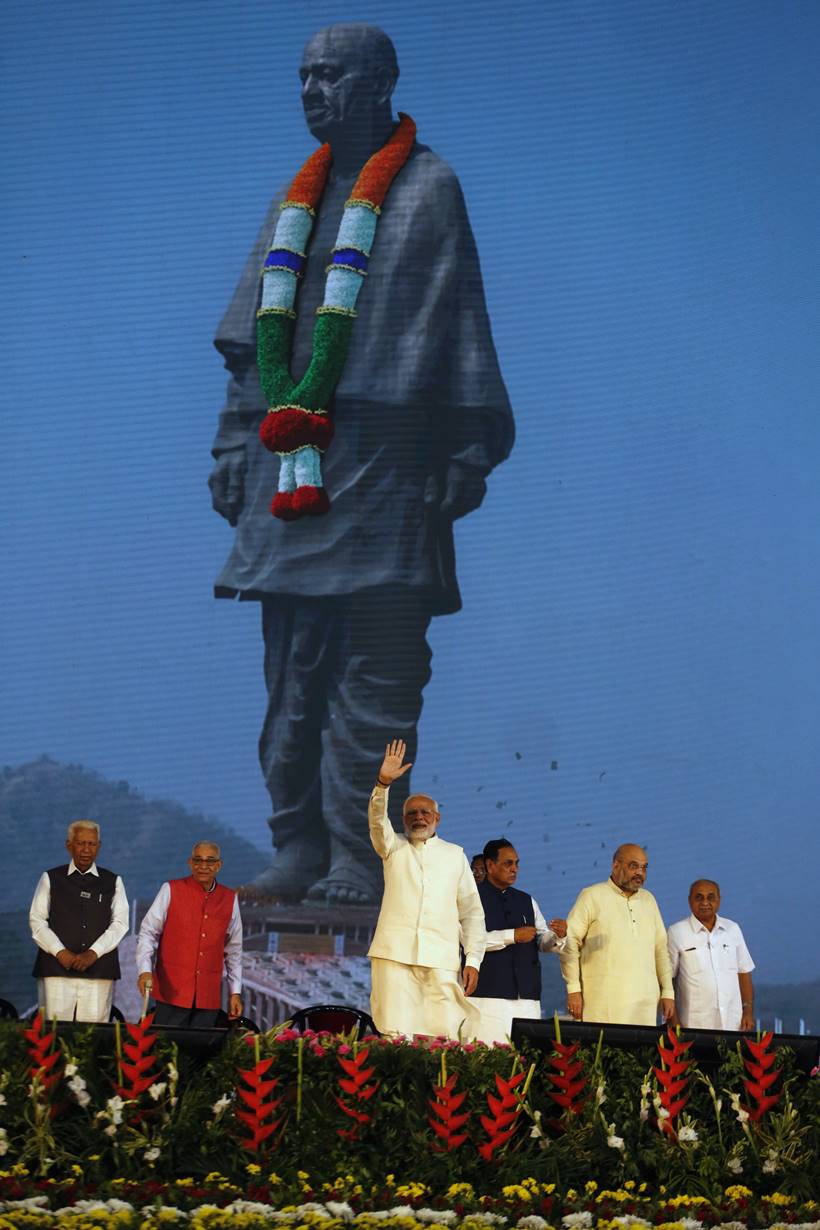


Prime Minister Narendra Modi attended the Rashtriya Ekta Diwas in Gujarat and hailed the abrogation of Article 370 in Jammu and Kashmir, along with the new Chief Minister taking oath on the Constitution. He also highlighted the importance of implementing Babasaheb Ambedkar's Constitution across the country. Addressing issues of militancy in North-East India, Modi stated that peace and development have been achieved through dialogue and trust, emphasizing recent agreements and ending unrest in the region.
Narendra Modi and the Indian Constitution: Strengthening Unity and Integralism
Prime Minister Narendra Modi has been a vocal proponent of the Indian Constitution, emphasizing its role in upholding the nation's unity and territorial integrity. His recent statements at the Rashtriya Ekta Diwas (National Unity Day) in Gujarat underscore his commitment to preserving and strengthening the fundamental principles of the country's founding document.
Abrogation of Article 370 and Integration of Jammu and Kashmir
In his address, Modi hailed the abrogation of Article 370 of the Indian Constitution, which had granted special status to the state of Jammu and Kashmir. This move, he argued, was necessary to fully integrate Jammu and Kashmir with the rest of India and promote its development and security. The abrogation was met with mixed reactions, with some opposing it as a violation of the state's autonomy.
Swearing-in Ceremony on the Constitution
Modi also highlighted the significance of the recent swearing-in ceremony of the new Chief Minister of Jammu and Kashmir, who took oath on the Indian Constitution. This, he said, symbolized the state's full commitment to the rule of law and the principles of the Indian Union.
Babasaheb Ambedkar and the Importance of the Constitution
Modi emphasized the need to implement Babasaheb Ambedkar's vision for the Indian Constitution, which he described as a "living document" that should guide the nation's governance and social progress. Ambedkar, the chief architect of the Constitution, envisioned a society based on equality, justice, and fraternity.
Addressing Militancy in North-East India
Modi addressed the issue of militancy in North-East India, highlighting the success of the government's efforts to bring peace and development to the region through dialogue and trust. He cited recent agreements with insurgent groups as evidence of the region's progress towards stability and normalcy.
Top 5 FAQs and Answers on Modi and the Constitution
1. Why did Modi hail the abrogation of Article 370?
Modi believes that abrogating Article 370 was necessary to fully integrate Jammu and Kashmir with the rest of India, promote its development, and enhance its security.
2. What was the significance of the Chief Minister taking oath on the Constitution?
The Chief Minister's oath on the Constitution symbolizes Jammu and Kashmir's full commitment to the rule of law and the principles of the Indian Union.
3. What is Babasaheb Ambedkar's vision for the Constitution?
Ambedkar envisioned the Constitution as a "living document" that should guide India's governance and social progress, promoting equality, justice, and fraternity.
4. How has the government addressed militancy in North-East India?
Through dialogue, trust-building, and recent agreements with insurgent groups, the government has brought peace and development to North-East India, ending unrest and promoting stability.
5. What is Modi's overall commitment to the Constitution?
Modi is a staunch supporter of the Indian Constitution and believes it is essential for preserving the nation's unity, promoting progress, and ensuring the rights of all citizens.

During a public meeting in Bihar, Union Home Minister Amit Shah dismissed any speculation about leadership changes by firmly stating that there is "no seat vacant" in politics. Praising Chief Minister Nitish Kumar and Prime Minister Narendra Modi, Shah urged the people of Bihar to vote for the NDA in the upcoming assembly elections. He also addressed various issues such as the construction of the Ram Temple and the ban on PFI, while emphasizing the NDA's strong leadership in the state.

Union Home Minister Amit Shah expressed his confidence that the BJP will emerge victorious in the upcoming assembly elections in West Bengal. He also criticized Chief Minister Mamata Banerjee and the ruling TMC for their opposition towards the special revision exercise for the voter list. The minister defended the legitimacy of the process and supported the Election Commission, while the opposition claims it is a ploy to manipulate voter lists before the polls.

Union Home Minister Amit Shah criticised the opposition's manifesto promise of providing government jobs in Bihar if they come into power. Calling it "nonsensical", Shah stated that such a promise is absurd and the opposition knows they will never come to power and will not have to fulfil any promises made. He also pointed out that the opposition's manifesto ignores the development strides made in Bihar, such as electricity and clean water reaching every village.

In an exclusive interview with News18 India, Union Home Minister Amit Shah dismissed Rahul Gandhi's allegations of "vote chori" (vote theft) and assured the people of Bihar that the BJP will take action against every single infiltrator in the country. He also addressed concerns about Nitish Kumar's health and stated that the Bihar CM was holding four rallies a day, proving that there was no question of his health being in poor shape. Additionally, Shah criticized the opposition's attempt to create a negative perception about Nitish Kumar.

In a recent interview with News18 India's "Sabse Bada Dangal Bihar 2025", Union Home Minister Amit Shah confidently stated that the NDA will form a government with an unprecedented two-thirds majority in the upcoming Bihar assembly elections. Shah also vehemently denied any concerns raised by the opposition regarding the health of Chief Minister Nitish Kumar, stating that both he and Kumar are holding four rallies a day. This marks a major shift in the political equation in Bihar, as the BJP and JD(U) are contesting an equal number of seats, a first in the state's electoral history.

PM Modi delivered a speech at the Maritime Leaders' Conclave in Mumbai, praising the government's efforts in revolutionizing and modernizing the country's shipping sector. He emphasized the nation's ports as being among the most efficient in the developing world, declaring that India has made significant progress in this area.

Union Minister Dharmendra Pradhan, who is also the BJP's in-charge for the Bihar polls, has strongly criticized Congress leader Rahul Gandhi for his derogatory comments against PM Modi. Pradhan has demanded a public apology from Gandhi for his remarks, stating that they are against basic norms of public discourse. He further added that this reflects the Congress' deep-rooted resentment and frustration towards PM Modi and his leadership. Meanwhile, Rahul Gandhi has kicked off his poll campaign in Bihar with a scathing attack on PM Modi, accusing him of "enacting all types of drama" for votes and running the state through remote control.

Elon Musk's xAI has launched Grokipedia, an AI-powered online encyclopedia to rival Wikipedia. Musk aims for the platform to be a "massive improvement" and free from any political bias. While Grokipedia currently sources content from Wikipedia, Musk plans to have all original content by the end of the year. This development adds to Bihar's political landscape, where leaders like Lalu Prasad and Nitish Kumar have dominated with their OBC politics, while Nitish's developmental narrative has transformed the state's political landscape.

BJP leader Chandrashekhar Bawankule sparked controversy with his statement that party workers' phones and WhatsApp groups are being monitored ahead of local body elections. Shiv Sena leader Sanjay Raut demanded his arrest, alleging that the phones of several Opposition leaders were also tapped. Bawankule clarified his statement, but the Sena leader questioned the involvement of BJP offices and technology networks, calling it a potentially anti-national act.

The Election Commission (EC) has announced the schedule for Special Summary Revision (SIR) of electoral rolls in 12 states and Union Territories (UTs) for the year 2025, excluding Assam due to the ongoing National Register of Citizens (NRC) process. While the BJP has welcomed the announcement, the Congress has raised concerns and questioned the decision. The Chief Election Commissioner (CEC) has stated that Assam has a separate provision in citizenship laws and the NRC process must be taken into consideration, causing potential delays in the SIR preparations. Despite the physical closure of banks in Ranchi and Patna, financial services will remain available through digital and self-service platforms, so customers are advised to use online banking and plan any in-branch visits accordingly.